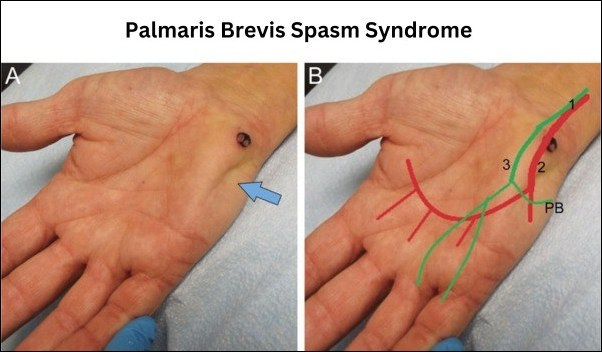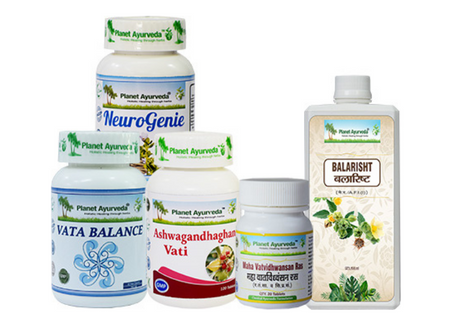Palmaris Brevis Spasm Syndrome Treatment In Ayurveda

Abstract
Palmaris brevis syndrome is pseudo dystonia which is characterized by abnormal involuntary contractions of the palmaris brevis muscle which is present in the hypothenar eminence. Neuromuscular disease is a disease which affects the peripheral nervous system, the neuromuscular junction is the component of the motor unit. Damage to the structures can cause muscle atrophy, it can be genetic or acquired. Neurological disorders affect the brain as well as the nerves throughout the human body and spinal cord. Structural, biochemical and electrical abnormalities in the brain and spinal cord cause various symptoms. The specific causes of neurological problems include genetic causes, congenital abnormality and lifestyle changes which include malnutrition, brain injury and nerve injury.
Neuroregeneration occurs in the peripheral nervous system. The brain and the spinal cord are enclosed in the skull and are isolated by the blood-brain barrier. In this article, we are going to discuss palmaris brevis syndrome symptoms, causes and its ayurvedic aspect in detail.

Introduction
The palmaris brevis is a thin quadrilateral muscle located on the hypothenar eminence and ulnar canal. It is a rare and benign condition of localised muscular hyperactivity causing intermittent twitching of the palmaris brevis muscle and this muscle is supplied by the ulnar nerve. It arises from the tendinous fasciculi from the transverse carpal ligament and palmar aponeurosis. The Palmaris brevis muscle tenses the skin during a grip action helps to deepen the hollow of the palm and has fatigue-resistant fiber-type action. The palmaris brevis is absent in approximately 3 % of the patient. It is located on the ulnar side of the hand and arises from the tendinous fasciculi, these muscles are inserted into the skin on the ulnar border and occasionally on the pisiform bone. The palmaris brevis act to fold the skin on the hypothenar eminence transversally. It is a striated muscle which plays a role in protecting the neurovascular bundle to grasp the thing and improve gripping which is characterized by spontaneous involuntary contractions of the palmaris brevis muscle. The Palmaris brevis is the only muscle which is innervated by the superficial branch of the ulnar nerve (C8-T1). This muscle has a fatigue-resistant fibre type which supports the protective function of ulnar nerve vasculature in grasping tasks.
Causes
- The exact cause of palmaris brevis syndrome is unknown
- Acquired causes such as C8 root compression
- Ulnar nerve injury can result in palmaris brevis spasm syndrome
Risk Factors
- Workers who use the vibratory tools
- Who uses and works continuously keyboards and mouse
Signs and Symptoms
- Irregular and involuntary dimpling of the hypothenar eminence
- Hyperactivity of the palmaris brevis muscle.
- It can be familial, bilateral and mostly seen in children.
- Three is subjective numbness in the small finger and ulnar half of the ring finger.
Investigations
- Electromyography (EMG)
- CT Scan
- MRI (Magnetic resonance imaging)
Diagnosis
- Anterior horn cell disease
Management
- Lignocaine block of the ulnar nerve
- Phenytoin and carbamazepine
- Injection of botulinum toxin
Ayurvedic Aspect and Treatment of Palmaris Brevis Spasm Syndrome
- Ayurveda is a life science which usually focuses on the treatment of the disease from its root cause as well as on dietary and lifestyle management. Ayurveda basically has three doshas- Vata, Pitta, and Kapha. When these doshas are under normal limits then the individual is healthy and some of the vitiations or imbalance causes the disease. Vata represents the balancing element of the body, it distributes the heat and coldness throughout the body and balances the physiological activities.
- Vata controls the functions of the body and is considered the remote control of the body, it helps to supervise the functions of the mind and perceptions. It governs the neurological functions of the body, all contractions and relaxations of the blood vessels and muscles are controlled by the Vata doshas. When the hamper of the doshas is seen it results in various symptoms such as numbness, muscle twitching and relaxation of the muscles.
- Vata doshas cause emaciation which causes the destruction of tissues and leads to muscle weakness and a nervous breakdown which includes numbness, pain, and scaling of the body.
- The main protocol is to maintain and correct the vitiated Vata doshas which will eventually correct the brevis spasm syndrome.
- Prana Vata and Vyana Vata are mainly responsible for carrying out most of the activities of the body including musculoskeletal development which enables movements.
Herbs Useful for Palmaris Brevis Spasm Syndrome
Eranda
Eranda (Castor) can be used externally and internally which is helpful in relieving pain and useful in neurological disorders. It helps to balance the Vata and Kapha doshas and it can enter the minute channels of the body. Eranda is helpful in abdominal tumors and helps to relieve the pain in the lower back, in urinary tract disorders and in rheumatoid arthritis. Useful in bronchitis, many skin diseases and in hepatitis. Improves digestion, ascites and balances the Vata doshas.
Rasna
Rasna (Pluchea lanceolata)is an ayurvedic herb which is useful in the treatment of pain, indigestion and in general debility. Its main action is to control the poison level in the body. Rasna is helpful in the enlargement of the abdomen and helps to relieve the ama doshas. Helpful in treating joint pain, known as a uterine tonic and has analgesic properties.
Kantakari
Kantakari (Solanum surattense) is a very useful herb which is used in respiratory tract disease. It has anti-inflammatory properties, which help to relieve hiccups and in treating pains and aches. Balances the Vata and Kapha Doshas, helps to stimulate the digestive fire and treats the dyspnoea and cough. Helpful in cardiac disorders, which reduces the fat and cholesterol level in the body.
Shyonaka
Shyonaka (Oroxylum Indicum) is known for its analgesic and anti-inflammatory properties. Helps to balance the Kapha and Vata doshas, acts as a purgative and is an effective remedy for constipation. Detoxify the blood which helps in cleansing the wound. Useful in gynaecological disorders and give relief to tonsils and are beneficial in heart disorders. Shyonaka has antifungal and antibacterial properties.
Herbal Remedies by Planet Ayurveda for Palmaris Brevis Spasm Syndrome
Planet Ayurveda is an eminent GMP-certified, ISO 9001:2015 certified and US- FDA registered Ayurvedic company which adheres to the objective of manufacturing quality Ayurvedic products as mentioned in a number of the ancient texts of ayurveda. The medicines manufactured here are free from any additives, preservatives and from any kind of chemicals and artificial flavouring agents which causes side effects on the body. The formulations which are prepared at planet Ayurveda are pure and devoid of any adulteration. These products are organic, vegetarian and gluten-free. For Palmaris brevis spasm syndrome planet, ayurveda provides herbal remedies which will show great results.
Products List
- Neurogenie Capsules
- Ashwagandha Vati
- Mahavat Vidhwansan Ras
- Balarisht
- Vata Balance
Products Description
1. Neurogenie Capsules
Neurogenie Capsules are polyherbal capsules made by planet ayurveda consisting of Brahmi (Bacopa monnieri), and Ashwagandha (Withania somnifera). These capsules help to promote neurological functions. It helps to promote the health of the muscle and provides coordination of nerve conduction. These capsules are rich in antioxidants which help to reduce the free radicals from the body, pacify the Vata doshas and are effective in neurodegenerative disorders.
Dosage- 1 capsule twice daily with plain water after meals.
2. Ashwagandha Ghan Vati
Ashwagandha Ghan Vati are herbal tablet formulations which are made by planet Ayurveda using Ashwagandha (Withania somnifera). Ashwagandha helps to maintain the overall health of the body. It helps to improve digestion and works as a diuretic and reduces the symptoms of asthma, reduces the inflammation of the uterus. Improves the neurological impulses and pacifies the Vata doshas and helps in proper movements and sensations.
Dosage- 2 tablets twice daily with lukewarm water.
3. Maha Vatvidhwansan Ras
Maha Vatvidhwansan Ras is a classical ayurvedic formulation which is helpful in pacifying the Vata doshas which consist of various ingredients such as Shuddha Parada (Purified Mercury), Tamra Bhasma (Calx of copper), Pippali (Piper longum), Tankan Bhasma (Calx of borax) and many more. It is helpful in balancing the tridoshas of the body which maintains healthy conditions. This tablet is used in shoulder dislocation pain and promotes the strength of bones and joints. Is an excellent anti-inflammatory and has analgesic properties.
Dosage- 1 tablet twice daily before or after meals.
4. Balarisht
Balarisht is a famous ayurvedic formulation which is made by planet ayurveda and helps to provide strength to the nerves and muscles. It contains various ingredients such as Bala (Sida cordifolia), Ashwagandha (Withania somnifera), Ksheer kakoli (Fritillaria roylei) and many more. It is known for its best nerve tonic, which helps to improve strength and has anti-inflammatory properties. It is used in various disorders such as Paraplegia, nasal congestion and in erectile dysfunction.
Dosage- 2 teaspoons twice daily with an equal amount of water.
5. Vata Balance
Vata Balance is polyherbal capsule which are made by planet ayurveda using various ingredients such as Bilwa (Aegle marmelos), Shyonak (Oroxylum indicum), Gambhari (Gmelina arborea), Shalparni (Desmodium gangeticum) and many more. These herbs are useful in pacifying the Vata dosha and regulating the normal functioning of Vata dosha and alleviating the irregular and involuntary spasmodic condition of the palmaris brevis muscle.
Dosage- 1-2 capsules twice daily
Contact Planet Ayurveda Support Team to provide you the costing / ordering and delivery information at – costing.planetayurveda@gmail.com or Call at 0172-521-4040 (India), +91-172-521-4040 (Outside India) or Whatsapp at (+91) 9915-593-604
Conclusion
Palmaris brevis syndrome is pseudo dystonia which is characterised by abnormal involuntary contractions of the palmaris brevis muscle which is present in the hypothenar eminence. The palmaris brevis is absent in approximately 3 % of the patient. It is located on the ulnar side of the hand and arises from the tendinous fasciculi, these muscles are inserted into the skin on the ulnar border and occasionally on the pisiform bone. The Palmaris brevis is the only muscle which is innervated by the superficial branch of the ulnar nerve (C8-T1). Prana Vata and Vyana Vata are mainly responsible for carrying out most of the activities of the body including musculoskeletal development which enables movements. Further, we discussed herbal remedies by planet ayurveda which will provide great relief to maintain a healthy body.





